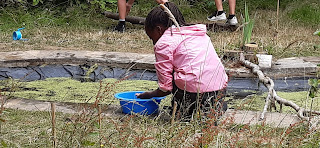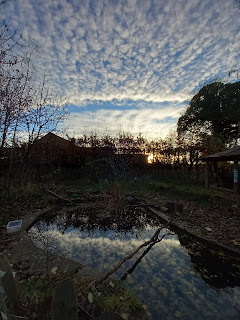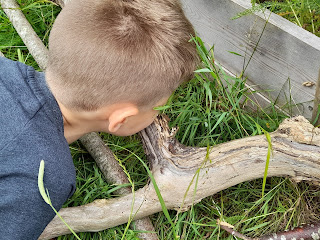Learning Without Walls.
Children love being outside.
All ages.
Yes, many will opt to be on their computer given half a chance, and this preference sways more to online activities as they grow older, but offered a day at the beach or a chance to ride a bike in a park, the vast majority of children will choose to go outside and do something.
Parents' are constantly trying to reduce screen time and keep children occupied while they are not online. Frequently the result is that children are 'climbing the walls' with parents going crazy to keep them entertained. However, as they say: if children are climbing the walls take the walls away!
Teachers are constantly trying to engage pupils with ever-growing range of abilities. They want to make their lessons memorable and meaningful. Frequently the result is that despite a high percentage of children on task, trying to appeal to those who are struggling with an aspect of their learning is demanding.
In October 2021 the UK Government published the results of 'The People and Nature Survey for England', a Child Data Project. This was carried out as we slowly emerged from the first Covid lockdown and faced opening schools. Almost half of the children reported worries about catching Covid and over a quarter said they felt lonely some or all of the time.
Despite 6 in 10 children having spent less time outside, over 90% of the children who were able to be outside during this time reported that being in nature made them happy.
This survey was undoubtedly influenced by the restrictions on family and community at the time of a pandemic, but it showed that in times of crisis, access to the 'Great Outdoors' made life more bearable, for children and adults.
This shouldn't be surprising. We often lose sight of the fact that humans are a part of nature. It is us. We use it and abuse it, we neglect it and take it for granted, but in doing so we use, abuse, and neglect ourselves, and our connection to everything else that makes this planet our home.
If being outside makes children feel 'happy', increases their engagement, and helps their focus then families and schools need to use it as a tool to make childhood a better experience, and child 'care' a little easier!
Chartham Primary School is on a journey to utilise outdoor space to the maximum. We are lucky, we have a lot of it! Our main and ongoing provision is Forest School. We invest in training staff and delivering sessions as often as possible, ensuring children get to see seasons change and experience the entire range of weather the planet supplies!
This is expanding a little this Spring, with Forest School sessions being offered to the neighbouring Nursery and a local school that is considering its own outdoor learning journey. We already host training to help Kent schools qualify a member of staff to deliver Forest School in their own setting, and this is hopefully going to run in Autumn as well as in Summer. Always, we encourage teaching staff to take lessons outdoors, to use the space we have to enhance and enrich the learning they provide, and support them in delivering as much as they can outdoors.
Forest School Sessions will continue no matter what.
The environmental charity Sylva Foundation considers it to be the most effective way to meet children's need for nature, although that doesn't mean it should be to the exclusion of all other outdoor opportunities.
Currently, I have EYFS and Years 3, 5, & 6 each week, while my fellow Forest School Leader has Years 1, 2, & 6.
This literally means Reception Class on a Wednesday morning, followed by Year 6 after lunch, which is quite an age range in one day! Keeping both age groups engaged outside requires a different way of thinking for each, but not necessarily different equipment, expectations, or experiences. Both Year groups have access to the same activities and resources, but in different ways, and with a quick alteration in between.
For example, both groups have access to info about birds and bugs, but for Reception it's photo tick charts, and for Year 6 it's spotter guides. EYFS has some toy birds which sing a realistic song... the eldest in the school have cards with amazing bird facts. Both classes like to dig, use the mud kitchen, and play chase games where there is space.
They all climb trees. They all look for bugs. They all create dens. The adjustment comes from the FSL, in suggestions we make, in responses and ideas from the children, and in our expectations of where the children can take their exploring.
The classes love exploring independently. They follow their own learning. Some days it may be an entire hour of Capture the Flag, or Tag Rugby, but if they need to expend all that energy it's a good idea to allow them the space and time to do this! Containing such energy does feel like children are 'climbing the walls' so take the walls away!
Other times they ask advice on how to do something - how to make, or build, or tackle a problem. They throw themselves into trouble shooting and problem solving and critical thinking. They engineer irrigation channels and tennis-ball-runs. They help each other create mud of the consistancy required to use as paint, or clay, or mud pies.
They watch out for one another, help to keep themselves and each other safe, while showing concern for the environment they are in. The collaborate and communicate. They experiment and investigate. They act wild and free, and they act calm and quiet. They chat and talk with adults. They marvel at a rainbow and a tadpole and a newt.
They find out how wet the rain actually is and how hot the sun can be. They watch puddles evaporate and canopies steam. They sit by a fire and they roll in the snow. They immerse themselves in the natural world and gain an understanding of it through touch, smell, sound and observation, they experience the outdoors wholly and holistically, learning without walls.
There is no right or wrong age to do this!
Forest School can offer this to many children at once, on different levels simultaneously.
So can outdoor learning sessions, although, unlike Forest School, they have a focus and planned outcome, children are more likely to respond positively to during the lesson and remember the learning they experienced outside for longer.
Looking back on my Primary School Years I don't remember any specific lesson. Not my 'best' maths lesson, or favourite English topic. I only vaguely remember some of the themes we covered yet I vividly recall the whole school trips to the seaside, and class museum trips, and time spent in the school garden. I can retrace in my mind the route we walked to the local pool, and the end of year picnics in the park opposite were a highlight.
I remember school outside of the classroom much more than school inside the classroom.
How about you?
Why would children today be different?
Take the walls away and see what happens.


















Comments
Post a Comment